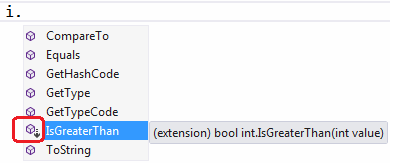C# Extension Method:
Extension methods, as the name suggests, are additional methods. Extension methods allow you to inject additional methods without modifying, deriving or recompiling the original class, struct or interface. Extension methods can be added to your own custom class, .NET framework classes, or third party classes or interfaces.
In the following example, IsGreaterThan() is an extension method for int type, which returns true if the value of the int variable is greater than the supplied integer parameter.
int i = 10;
bool result = i.IsGreaterThan(100); //returns false
The IsGreaterThan() method is not a method of int data type (Int32 struct). It is an extension method written by the programmer for the int data type. The IsGreaterThan() extension method will be available throughout the application by including the namespace in which it has been defined.
The extension methods have a special symbol in intellisense of the visual studio, so that you can easily differentiate between class methods and extension methods.

Now let's see how to write an extension method.
 LINQ is built upon extension methods that operate on IEnumerable and IQeryable type.
LINQ is built upon extension methods that operate on IEnumerable and IQeryable type.
An extension method is actually a special kind of static method defined in a static class. To define an extension method, first of all, define a static class.
For example, we have created an IntExtensions class under the ExtensionMethods namespace in the following example. The IntExtensions class will contain all the extension methods applicable to int data type. (You may use any name for namespace and class.)
namespace ExtensionMethods
{
public static class IntExtensions
{
}
}
Now, define a static method as an extension method where the first parameter of the extension method specifies the type on which the extension method is applicable. We are going to use this extension method on int type. So the first parameter must be int preceded with the this modifier.
For example, the IsGreaterThan() method operates on int, so the first parameter would be, this int i:
namespace ExtensionMethods
{
public static class IntExtensions
{
public static bool IsGreaterThan(this int i, int value)
{
return i > value;
}
}
}
Now, you can include the ExtensionMethods namespace wherever you want to use this extension method.
using ExtensionMethods;
class Program
{
static void Main(string[] args)
{
int i = 10;
bool result = i.IsGreaterThan(100);
Console.WriteLine(result);
}
}

Points to Remember :
- Extension methods are additional custom methods which were originally not included with the class.
- Extension methods can be added to custom, .NET Framework or third party classes, structs or interfaces.
- The first parameter of the extension method must be of the type for which the extension method is applibable, preceded by the this keyword.
- Extension methods can be used anywhere in the application by including the namespace of the extension method.
Learn about anonymous type next

